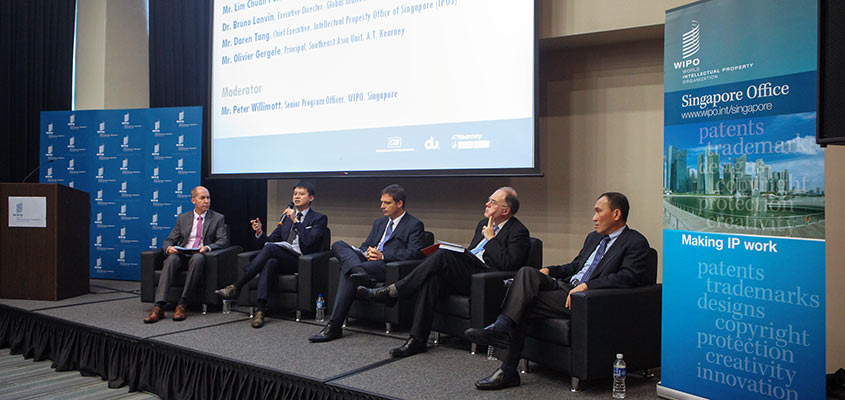Regional Roundtable on the Global Innovation Index
November 21, 2016
Leading members of Singapore’s intellectual property (IP) community recently attended a regional roundtable at which they and other experts discussed different aspects of the Global Innovation Index 2016 (GII).

Mr. Bruno Lanvin (Executive Director, Global Indices, INSEAD, and Co-Editor of the GII) opened proceedings by explaining the methodology behind the report before identifying some of the key points from the GII for Singapore. He commended Singapore’s efforts in supporting innovation and noted that, “The world is watching you Singapore, watching and learning from a country that has done really well to establish such a strong innovation input eco-system.”
The Chairman of the Agency for Science, Technology and Research (A*STAR), Singapore, Lim Chuan Poh contributed a chapter to the GII 2016 entitled ‘From Research to Innovation to Enterprise: The Case of Singapore’, which formed the basis of his presentation at the event. “In just 50 years, Singapore has transformed itself from a developing economy with few natural resources to a thriving global metropolis,” he said. Chairman Lim attributed much of Singapore’s success to the country’s long term investments in science and innovation.
The GII and ASEAN countries
Following the keynote address, Mr. Daren Tang (Chief Executive, IPOS) and Mr. Olivier Gergele (Principal, A.T. Kearney, Southeast Asia Unit) joined the two speakers on stage for a panel discussion that focused on the GII findings from an ASEAN-wide perspective.
Apart from Singapore’s ranking of sixth overall in the GII 2016, there were highlights in the Index for each participating ASEAN Member State, all of which, unlike in 2015, were ranked in the top 100:
- Cambodia: ranked 9th in the world for the different variables relating to credit which includes criteria such as ease of getting credit, and microfinance gross loans as a % of GDP.
- Indonesia: ranked 10th in the world for the Market sophistication criteria of ‘Trade, Competition and Market Scale’, which is a rise from a ranking of 48 in the 2015 index.
- Malaysia: for ‘Graduates in science and engineering, %’ Malaysia was ranked 6th in the world, up from 9th the year before.
- Philippines: Rose 17 places compared to the 2014 Index and up 9 places from the 2015 GII to be number 77 in the world in 2016
- Thailand: Ranked 5th in the world for the criteria ‘Creative Goods Exports, % of total trade’
- Vietnam: Was ranked 21st for ‘Expenditure on education, % of GDP’, up from 24 in the 2015 GII.
More about the GII
The GII ranks 128 economies on their innovation environment and performance and is co-published by Cornell University, INSEAD, and WIPO.